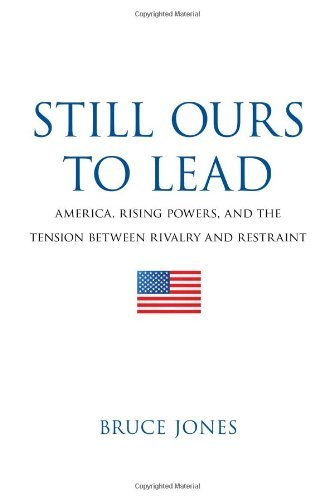I was going over Richard Rosecrance’s explication on UCTV of his his latest international relations thesis: The Resurgence of the West: How a Transatlantic Union Can Prevent War and Restore the United States and Europe. His analysis demands comment. But not right at this moment.
I am going to segue in fact to another colleagues who is about to have his book arrive momentarily on bookshelves – or at least the digital equivalent. This is Bruce Jones a senior fellow and the director of the Project on International Order and Strategy at Brookings and also the director of of the Center on International Cooperation at New York University. The book, Still Ours to Lead: America, Rising Powers, and the Tension between Rivals and Restraint will be released in the next few days but Bruce has produced a number of articles that summarize, I presume, at least the thesis of the book. I am content – at least at this early stage – to rely on his own analysis to understand his view of the international system.
Jones has been engaged for some time with the rising powers, in his research and at the UN, and it would appear that his book is concerned with the rise of the large emerging states at least – China, India, Brazil – and also apparently Russia – though he makes clear he sees the behavior of Russia as distinct from the other three. Not surprisingly, given that Bruce is ensconced in the ‘beltway’ or at least its near environs, New York, that this book for Brookings tackles US leadership in an altered, or altering, global world. It would seem that the subtitle “Rivalry and Restraint” is most apt. As he says:
In short, there are a lot of sources of tension and rivalry in contemporary international politics, but also important sources of restraint – and of cooperation, against terrorism in particular , but also proliferation and threats to trade.
Now it appears that the big three emerging powers are playing an increasingly important role in the international system; that these three want to challenge the West’s dominance in key global regimes, even, according to Jones, to reshape policies in trade and finance, but not break them.
So where does that leave the United States? According to Jones:
Navigating this tense balance between rivalry and restraint is going to be the dominant challenge for American leadership in the years to come. It’s going to take patient management of our allies (and a certain patience by our allies), and its going to take an ability to work with countries like India and Brazil that are neither friend nor foe. … We [US] have the underlying capacity, a powerful alliance structure, and a favorable international landscape.
Now the characterization of India and Brazil, at least, as ‘neither friend nor foes’ evokes a longstanding and continuing debate over US-China relations, though this characterization may now be exhausted – but that’s for another day. But the principal point is that Jones’s is pointing to continued US leadership though presumably more nuanced and strategic in this era of flux.
In an earlier post “Not Required to Choose” I suggested that the US, at least with respect to relations with China, was now required to hold ‘irreconcilables together’, and I held up to the light the nuanced policy of the great nineteenth century statesman, Chancellor Otto von Bismarck, at least after 1871. Now it may be that US leadership does not exactly need to match the ‘alliance magic’ that Bismarck displayed over a century ago but it does suggest a far more delicate strategic and patient management by the US of global affairs.
And that is the rub. US leadership, and indeed, its political structure including oppositional congressional politics, makes it very hard, if not impossible according to some for the US to lead in the manner required. Indeed there has been much criticism lately of the current administration’s policy – in Libya (Jones himself criticizes US policy here in his short essay), Syria and by some of the Ukraine. Now the criticism of US actions may be the product of just a particular president but it may reflect US policymaking more generally. And if the latter is true then I think the notion of the US continuing to lead requires more than what Jones seems to suggest. We will have dig further on how great power relations can and need to be managed in a ‘world in flux’.
US leadership is a part of the equation; but it is just part. In the end the answer is less structural and more behavioral. It is less about power and its distribution, more about the influence equation. It demands greater effort to overcome the collective action problem in global politics and it requires greater success in the exercise of coalitional action.
Great power relations in such a multiverse concert are very complicated. Just look at the questions raised over Russia and its recent actions in Crimea. A world in flux indeed.
Image Credit: www.amazon.com


